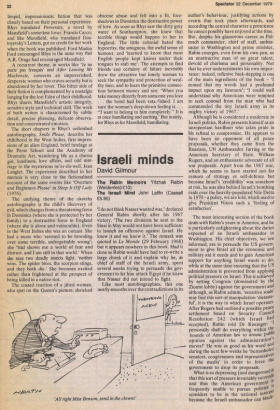Sense of evil
Jeffrey Meyers
Smile Please Jean Rhys (Deutsch £4.95) Jean Rhys was born only two years after Katherine Mansfield, lived for 56 years after Mansfield's death and died in her late ,eighties in 1979. The slightly older writer was both a model and an influence, and there are striking parallels in their lives and art. Both had comfortable but circumscribed childhoods on a colonial island (New Zealand and Dominica), felt remote from their conventional parents, especially after the birth of their youngest sister; and were sensitive, introspective girls who soon sensed corruption and evil in their apparently idyllic world. Both were sent to school in England in their teens and decided to remain there. They were exceptionally beautiful young women and had some early theatrical experience: Mansfield in nightclubs and films, Rhys as a chorus girl. Both felt like an outsider in England, tried to escape from loneliness and poverty, craved experience, and had reckless, selfdestructive relationships with men. They lived a bohemian life on the artistic fringe of Paris, had abortions, married early, divorced their first husband. Both adopted a pseudonym when they began to write limpid, impressionistic fiction that was closely based on their personal experience. Rhys translated Perversity, a novel by Mansfield's sometime lover, Francis Came; and like Mansfield, who translated Dostoyevsky's Letters, got no credit for her work when the book was published. Ford Madox Ford encouraged Rhys in the same way that A.R. Orage had encouraged Mansfield.
A recurrent theme, in works like le ne pane pas frangais' and After Leaving Mr Mackenzie, concerns an impoverished, desperate woman who craves security but is abandoned by her lover. This bitter side of their fiction is complemented by a nostalgic longing for the lost Eden of their childhood. Rhys shares Mansfield's artistic integrity, sensitive style and technical skill. The work of both writers is' characterised by subtle detail, precise phrasing, delicate observation and concentrated emotion.
The short chapters in Rhys's unfinished autobiography, Smile Please, describe her childhood in the West Indies, first impressions of an alien England. brief tutelage at the Perse School and the Academy of Dramatic Art, wandering life as a chorus girl, loneliness, love affairs, and odd marriage to the mysterious ne'er-do-well, Jean Langlet. The experience described in her memoir is very close to the fictionalised account of the same events like 'Overture and Beginners Please' in Sleep It Off Lady (1976).
The unifying theme of the sketchy autobiography is the child's discovery of evil, which changes from a threatening force in Dominica (where she is protected by her family) to a destructive force in England (where she is alone and vulnerable). Even in the West Indies she was an outcast. She had a nurse who 'seemed to be brooding over some terrible, unforgettable wrong'; she 'had shown me a world of fear and distrust, and I am still in that world.' When she sees two deadly insects fight, 'neither wins. The spider bites, the scorpion stings, and they both die.' She becomes excited rather than frightened at the prospect of being killed in a native riot.
The crazed reaction of a jilted woman, who spat on the Queen's picture, shrieked obscene abuse and fell into a fit, foreshadows in Dominica the destructive power of love. As soon as Rhys saw the dirty grey water of Southampton, she knew that terrible things would happen to her in England. The little colonial hated the hypocrisy, the smugness, the awful sense of humour, and 'learned to know that most English people kept knives under their tongues to stab me'. The attempts to find friends and certainty of failure inevitably drew the attractive but lonely woman to seek the sympathy and protection of wealthy men, and to learn the primitive connection between money and sex: 'When you take money directly from someone you love the bond had been esta,oished. I am sure the woman's deep-down feeling is. . . "I want to belong to him completely." It is at once humiliating and exciting.' But mainly, for Rhys as for Mansfield, humiliating.



























































 Previous page
Previous page